MAX3093ECUE+ Maxim Integrated Products, MAX3093ECUE+ Datasheet - Page 8

MAX3093ECUE+
Manufacturer Part Number
MAX3093ECUE+
Description
IC RS485/422 RX 10MBPS 16TSSOP
Manufacturer
Maxim Integrated Products
Type
Receiverr
Datasheet
1.MAX3093ECSE.pdf
(13 pages)
Specifications of MAX3093ECUE+
Number Of Drivers/receivers
0/4
Protocol
RS422, RS485
Voltage - Supply
4.75 V ~ 5.25 V
Mounting Type
Surface Mount
Package / Case
16-TSSOP
Lead Free Status / RoHS Status
Lead free / RoHS Compliant
As with all Maxim devices, ESD-protection structures are
incorporated on all pins to protect against ESDs encoun-
tered
MAX3093E/MAX3094E receiver inputs have extra
protection against static electricity found in normal
operation. Maxim’s engineers have developed state-
of-the-art structures to protect these pins against ±15kV
ESD without damage. After an ESD event, the
MAX3093E/MAX3094E continue working without latchup.
ESD protection can be tested in several ways. The
receiver inputs are characterized for protection to the
following:
• ±15kV using the Human Body Model
• ±8kV using the Contact Discharge Method specified
• ±15kV using the Air-Gap Method specified in
ESD performance depends on a number of conditions.
Contact Maxim for a reliability report that documents
test setup, methodology, and results.
Figure 4a shows the Human Body Model, and Figure
4b shows the current waveform it generates when dis-
charged into a low impedance. This model consists of a
100pF capacitor charged to the ESD voltage of interest,
which is then discharged into the device through a
1.5kΩ resistor.
Since January 1996, all equipment manufactured and/or
sold in the European community has been required to
meet the stringent IEC 1000-4-2 specification. The IEC
1000-4-2 standard covers ESD testing and performance
of finished equipment; it does not specifically refer to inte-
grated circuits. The MAX3093E/MAX3094E help you
design equipment that meets Level 4 (the highest level) of
IEC 1000-4-2, without additional ESD-protection compo-
nents.
±15kV ESD-Protected, 10Mbps, 3V/5V,
Low-Power Quad RS-422/RS-485 Receivers
8
_______________Detailed Description
in IEC 1000-4-2 (formerly IEC 801-2)
IEC 1000-4-2 (formerly IEC 801-2)
_______________________________________________________________________________________
during
handling
±15kV ESD Protection
and
ESD Test Conditions
Human Body Model
assembly.
IEC 1000-4-2
The
The main difference between tests done using the
Human Body Model and IEC 1000-4-2 is higher peak
current in IEC 1000-4-2. Because series resistance is
lower in the IEC 1000-4-2 ESD test model (Figure 5a), the
ESD-withstand voltage measured to this standard is gen-
erally lower than that measured using the Human Body
Model. Figure 5b shows the current waveform for the
±8kV IEC 1000-4-2 Level 4 ESD Contact Discharge test.
The Air-Gap test involves approaching the device with a
charge probe. The Contact-Discharge method connects
the probe to the device before the probe is energized.
The Machine Model for ESD testing uses a 200pF stor-
age capacitor and zero-discharge resistance. It mimics
the stress caused by handling during manufacturing
and assembly. All pins (not just RS-485 inputs) require
this protection during manufacturing. Therefore, the
Machine Model is less relevant to the I/O ports than are
the Human Body Model and IEC 1000-4-2.
The function tables show the functionality of the enable
inputs. The MAX3093E/MAX3094E enter shutdown
when ENAC and ENBD are low. In shutdown, all out-
puts go high impedance and the devices typically draw
less than 1nA. The devices exit shutdown by taking
either ENAC or ENBD high. The typical shutdown exit
time is 600ns.
Function Tables
X = don’t care, High-Z = high impedance
ENAC
ENBD
1
1
1
0
0
1
1
1
0
0
ENBD
ENAC
X
X
X
X
X
X
1
0
1
0
Low-Power Shutdown Mode
(IN+ - IN-)
(IN+ - IN-)
≤ -200mV
≤ -200mV
≥ 200mV
≥ 200mV
Open
Open
X
X
X
X
YA OR YC
YB OR YD
OUTPUT
OUTPUT
High-Z
High-Z
High-Z
High
1
0
1
1
0
1
Machine Model
Shutdown
Shutdown
DEVICE
DEVICE
MODE
MODE
On
On
On
On
On
On
On
On











